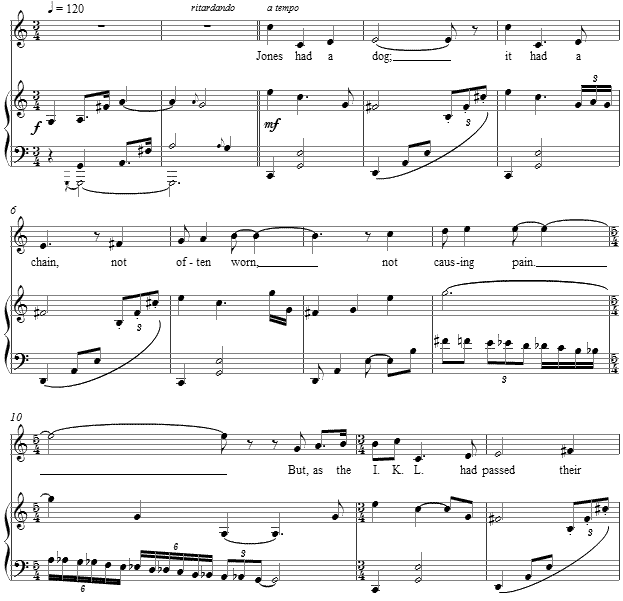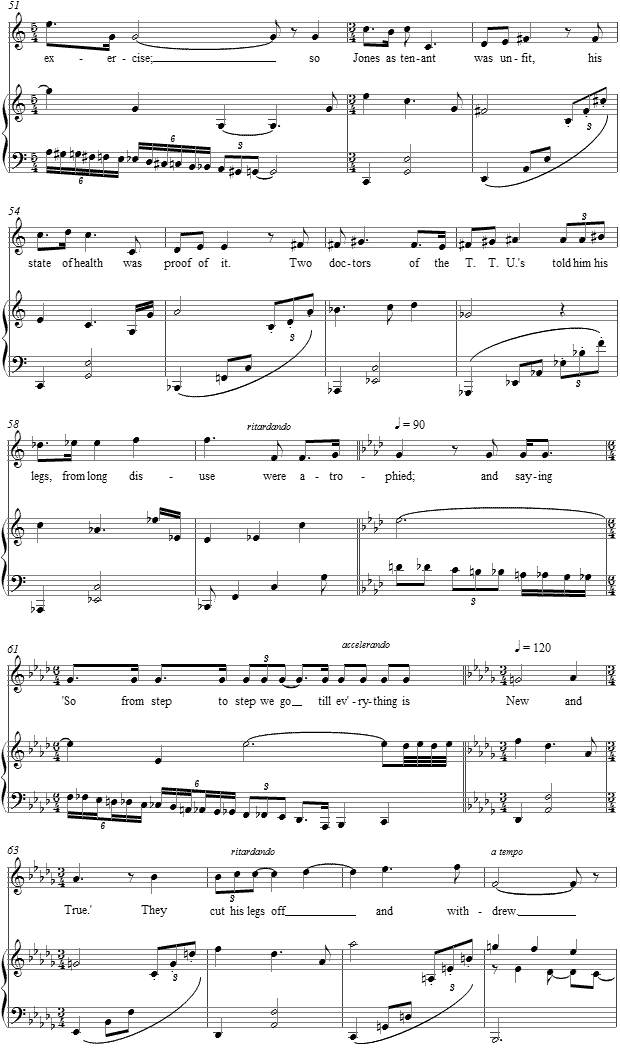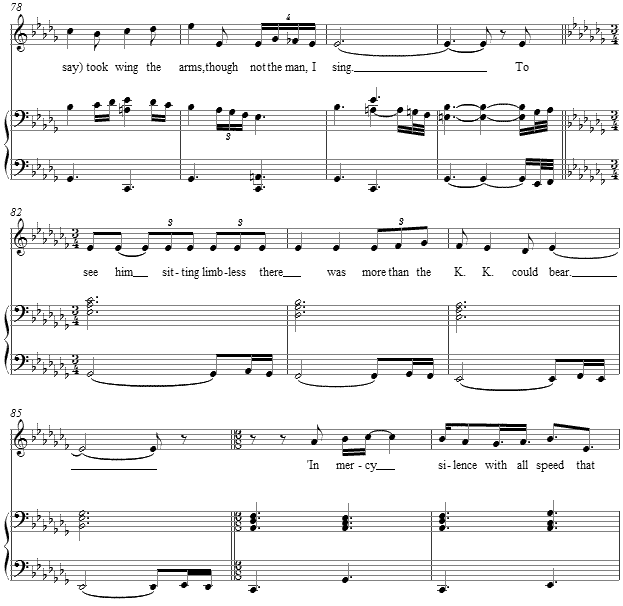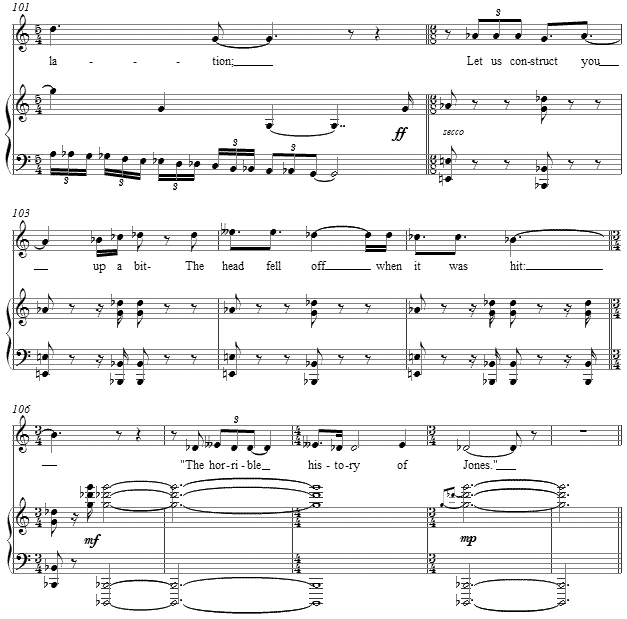Music and Texts of GARY BACHLUND
Vocal Music | Piano | Organ | Chamber Music | Orchestral | Articles and Commentary | Poems and Stories | Miscellany | FAQs
The Horrible History of Jones - (2006)
G. K. Chestertonfor medium high voice and piano
Jones had a dog; it had a chain;
Not often worn, not causing pain;
But, as the I. K. L. had passed
Their 'Unleashed Cousins Act' at last,
Inspectors took the chain away;
Whereat the canine barked 'Hooray!'
At which, of course, the S. P. U.
(Whose Nervous Motorists' Bill was through)
Were forced to give the dog in charge
For being Audibly at Large.
None, you will say, were now annoyed,
Save, haply, Jones - the yard was void.
But something being in the lease
About 'alarms to aid the police,'
The U. S. U. annexed the yard
For having no sufficient guard.
Now if there's one condition
The C. C. P. are strong upon
It is that every house one buys
Must have a yard for exercise;
So Jones, as tenant, was unfit,
His state of health was proof of it.
Two doctors of the T. T. U.'s
Told him his legs, from long disuse,
Were atrophied; and saying 'So
From step to higher step we go
Till everything is New and True.'
They cut his legs off and withdrew.
You know the E. T. S. T.'s views
Are stronger than the T. T. U.'s:
And soon (as one may say) took wing
The Arms, though not the Man, I sing.
To see him sitting limbless there
Was more than the K. K. could bear.
'In mercy silence with all speed
That mouth there are no hands to feed;
What cruel sentimentalist,
O Jones, would doom thee to exist -
Clinging to selfish Selfhood yet?
Weak one! Such reasoning might upset
The Pump Act, and the accumulation
Of all constructive legislation;
Let us construct you up a bit - '
The head fell off when it was hit:
Then words did rise and honest doubt,
And four Commissioners sat about
Whether the slash that left him dead
Cut off his body or his head.
An author in the Isle of Wight [ 1 ]
Observed with unconcealed delight
A land of just and old renown
Where Freedom slowly broadened down
From Precedent to Precedent.
And this, I think, was what he meant.[ 10 pages, 4' 45" ]
G. K. Chesterton
This dark tale in rhyme of ever more aggressive bureaucracy and governance tells of the downward spiral for one Mr. Jones from charitably motivated actions under law to utter depravity, also under law. The political parties -- all actors named by abbreviations -- play their dread parts to the ultimate conclusion. The belief in the modern welfare-oriented state and the rhetoric through which it is purveyed to the public is not new. Plato told of the argument from millennia ago. Britannica summarizes the argument nicely:
"Gorgias holds that rhetoric is the queen of all 'arts.' If the statesman skilled in rhetoric is clever enough, he can, though a layman, carry the day even against the specialist. Socrates, on the other hand, declares that rhetoric is not an art but a mere 'knack' of humouring the prejudices of an audience."
In the modern state, many state enterprises are presented through the guise of being for the "good." Among the "good" in the twentieth century were the Nazi's reprehensible Jewish laws attempting to rid whole nations of Jewish "contagion," the enthusiastic adoption of eugenicist Margaret Sanger's "planning" of parenthood which has become the sacrosanct and state-sponsored aborting of "unwanted" millions per year, and the long-held allegiance to the capital punishment wherein errors in judicial procedure and outcome cannot be overturned. The arguments of politics are, as Socrates so well suggested in a lesson which should be heeded today, often a mere knack of humoring the prejudices of an audience.
Early on a Socialist and later an avowed anti-Socialist who became clearly skeptical of government, Chesterton saw political movements as capable of a kind of creeping incrementalism, layer after layer of well intentioned laws piling on, eventually becoming a repressive system in which the "good" was so clearly subsumed to government that an individual but contrary understanding of "good" itself became a political offence. The seminal work of George Orwell, at one time also a Socialist, in "Animal Farm" and "1984" tells metaphorical stories of the state in which "good" is defined in law, with dire result. Lest this seem fiction, the history of the Third Reich, Mussolini's Italy, the Vichy government, the Soviet gulag and Maoist China's Cultural Revolution, among others of ghastly proportion, all tell the same tale.
This "same tale" begins, as so many did, pleasantly. A modest introduction brings the opening theme -- a waltz in C major, which vacillates initially between C and D major. This is meant dramaturgically to hint at the individual citizen who vacillates between political positions never realizing how fate is tempted by the smallest of openings.
A program note to explain Chesterton's use of initials to name political parties should be made. It is, of course, common practice throughout Europe. In Germany, this year's government is ruled in a coalition by the CDU and SPD, while the FDP and others play outsiders roles. In the United States, the Republicans' Grand Old Party is often abbreviated the GOP, and the Democrats' ruling council is called the DNC.
It is interesting that modern politics seems to favor the general over the specific, the slogan over the unambiguous policy statement and the abbreviation over a meaningfully chosen name, all the while the old adage reminds us that the "devil is in the details" [ 2 ]
As the continuing return to the waltz theme begins to break apart, other tonal regions creep into the progression, indicating the coming dissonances as the dissonance of the story unfolds. The polytonal twist makes harmonies collide as the doctors diagnose Jones with "atrophied" legs and amputate -- apparently with his consent, since no mention is made of Jones not consenting. One considers the historical details of so many "villagers" marched off by "liberators" to their graves, when perhaps an uprising would have been much more appropriate. There is at this point in the story no Warsaw uprising, no counter-revolution, no resistance. This is what trust in the "political process" often achieves -- misplaced trust.
And so into the tale step the "empathetic," who would save the sufferer from his suffering by inflicting yet more "mercy." By this time, the new key signature of C flat brings the performer far away from many common tones with the original C major, a reflection of how far "concern" may carry one into murderousness without too much notice and displacement.
The waltz has disintegrated, and the ensuing quasi-recitative includes the title of the poem itself, indeed a "horrible history." But such a history does not end with the death of one. Rather it continues as the bureaucrats play further through their ongoing work of empty disputation. After all, that is the mother's milk of the politician and bureaucrat who so easily and step by step encroach into freedom for their own "common good." One need only think of so many revolutions which resulted in death and enslavement of millions, a most modern history. [ 3 ]
A final reprise of the C major waltz, now in lower and more somber A-flat, accompanies the last lines, as Chesterton nods at the meaning of Tennyson's "freedom."
The enemies of freedom are not merely the fascistic socialists for whom the "common good" becomes an instrument of enslavement and death, but those who refuse the lesson given us from centuries ago -- from Socrates through Chesterton and to today -- with each small step further towards the "common good" which crushes by degree the "individual good." With the recurrence of the waltz theme comes the necessity to see this same story is enacted all over again, a truth of human history.
Must this be the reality of modern life, or is there a chance that Tennyson's notion as again stressed by Chesterton might hold sway? Shall we see yet more "banded unions persecute opinions, and induce a time when single thought is civil crime, and individual freedom mute?" The likely answer remains -- sadly yes. Would that it were not so.
A cycle of six of G. K. Chesterton's poems is titled Drolleries and Wisdom.
The score for The Horrible History of Jones is available as a free PDF download, though any major commercial performance or recording of the work is prohibited without prior arrangement with the composer. Click on the graphic below for this piano-vocal score.
NOTES
[ 1 ] The poet, Alfred Lord Tennyson (1809-1892), lived on the Isle of Wight for the last 40 years of his life. "A land ... precedent' are from Tennyson's "You Ask Me, Why." The full text speaks of a sentiment quite like the more humorous poem by Chesterton, and with which Chesterton obviously agrees. Freedom remains the freedom to speak one's mind, and to oppose that freedom tends towards fascistic rhetoric that is "a mere 'knack' of humouring the prejudices of an audience." [ Britannica ]
You ask me, why, tho' ill at ease,
Within this region I subsist,
Whose spirits falter in the mist,
And languish for the purple seas.
It is the land that freemen till,
That sober-suited Freedom chose,
The land, where girt with friends or foes
A man may speak the thing he will,
A land of settled government,
A land of just and old renown,
Where Freedom slowly broadens down
From precedent to precedent;
Where faction seldom gathers head,
But, by degrees to fullness wrought,
The strength of some diffusive thought
Hath time and space to work and spread.
Should banded unions persecute
Opinions, and induce a time
When single thought is civil crime,
And individual freedom mute,
Tho' power should make from land to land
The name of Britain trebly great --
Tho' every channel of the State
Should fill and choke with warm sand --
Yet waft me from the harbor-mouth,
Wild wind! I seek a warmer sky,
And I will see before I die
The palms and temples of the South.
[ 2 ] "The devil is in the details."
The German-American architect, Mies van der Rohe (1886-1969), used this German expression often.
In German, "Der Teufel steckt im Detail." Mies' early Expressionist memorial to the murdered Communist leaders Karl Liebknecht and Rosa Luxemburg, dedicated in 1926, was demolished by the Nazis, reminding us that governments often, easily and willfully destroy. Mies was formative in the modern skyscraper movement, and director of the School of Architecture at Chicago's Armour Institute (later the Illinois Institute of Technology), after fleeing the Nazi travesty in Germany. Among his many buildings are included the Seagram Building in New York City, the Bacardi Building in Mexico City, One Charles Center office building in Baltimore, the Federal Center in Chicago, the Public Library in Washington, D. C, and the Gallery of the Twentieth Century (later called the New National Gallery) in Berlin, dedicated in 1968.
Often cited originally as a German or Swiss French proverb, an inverse of the quote is ascribed to the early twentieth century Swiss architect, "Le Corbusier" whose real name was Charles-Joseph Jeanneret. He created a movement known as the International Style. Known for his designs with unusual curves and unconventional shapes, he suggested that "God is in the details." But God is not the devil, and the "goodly" outcome of Chesterton's "The Horrible History of Jones" is most assuredly not godly.
In manifestos by Le Corbusier (1887-1965) -- The City of Tomorrow and Its Planning (1925) and The Radiant City (1933), he called for a dramatic break with the past, demanding that "existing centers must come down. To save itself every great city must rebuild its center." He advocated high-rise tenements in a movement called Urbanism, and is quoted as saying "by law, all buildings should be painted white." He imagined massive apartment buildings -- which later generations of architects laughing term "Collectorates" -- housing as many as forty thousand people, and a Modernist, urbanist movement in architecture as a tool of social collectivism was spawned. He is quoted, "All cities have fallen into a state of anarchy." Oddly as some of Le Corbusier's buildings which turned into slum areas are being razed, perhaps his designs were also not as godly as he portrayed them to be. Rather they ultimately contributed to the "anarchy" against which he proposed his answer. History appears to yet again be correcting the "collective" which deprive individuals of their individualism for the sake of a collectivist's notion of the "common good." Oddly, some of Le Corbusier's still prized designs are for single, smaller buildings including churches and furniture. They, of course, remain "individual," not a part of some massive collective -- the ready-made slum which he did not foresee as the error of his political opinion blinded the novelty of his individual artistic vision.
"Le diable se cache dans les détails." The notion is however not that new as a proverb.
Seneca (circa 4 BCE - 65 CE) wrote "Errare humanum est. Perseverare diabolicum." [To err is human. To repeat error is of the devil.]
The repetition of horrendous state-sponsored acts as Chesterton's poem outlines is so easily in man's recent political history worldwide; that man has not learned this lesson since the time of Seneca seems proof that the political animal is ultimately not about heeding the lessons of history, about classical learning nor about the "common good." Those who would argue against this argue against centuries of wisdom, the most enduring of the arts, architecture and literature, and the most productive of thinkers down through the ages.
[ 3 ] The clarity of Chesterton's tale is reflected in the reality that Jones is "the forgotten man," a phrase telling much about "the reformer, the social speculator, and philanthropist...." One reads:
"As soon as A observes something which seems to him wrong, from which X is suffering, A talks it over with B, and A and B then propose to get a law passed to remedy the evil and help X. Their law always proposes to determine what C shall do for X, or, in better case, what A, B, and C shall do for X... What I want to do is to look up C... I call him the forgotten man... He is the man who never is thought of. He is the victim of the reformer, the social speculator, and philanthropist, and I hope to show you before I get through that he deserves your notice both for his character and for the many burdens which are laid upon him." In "The Forgotten Man and Other Essays," by William Graham Sumner, ed. Albert Galloway Keller (New Haven, Yale University Press, 1918).




